From Trayvon Martin to Colin Kaepernick
The story of Black Lives Matter
in sport
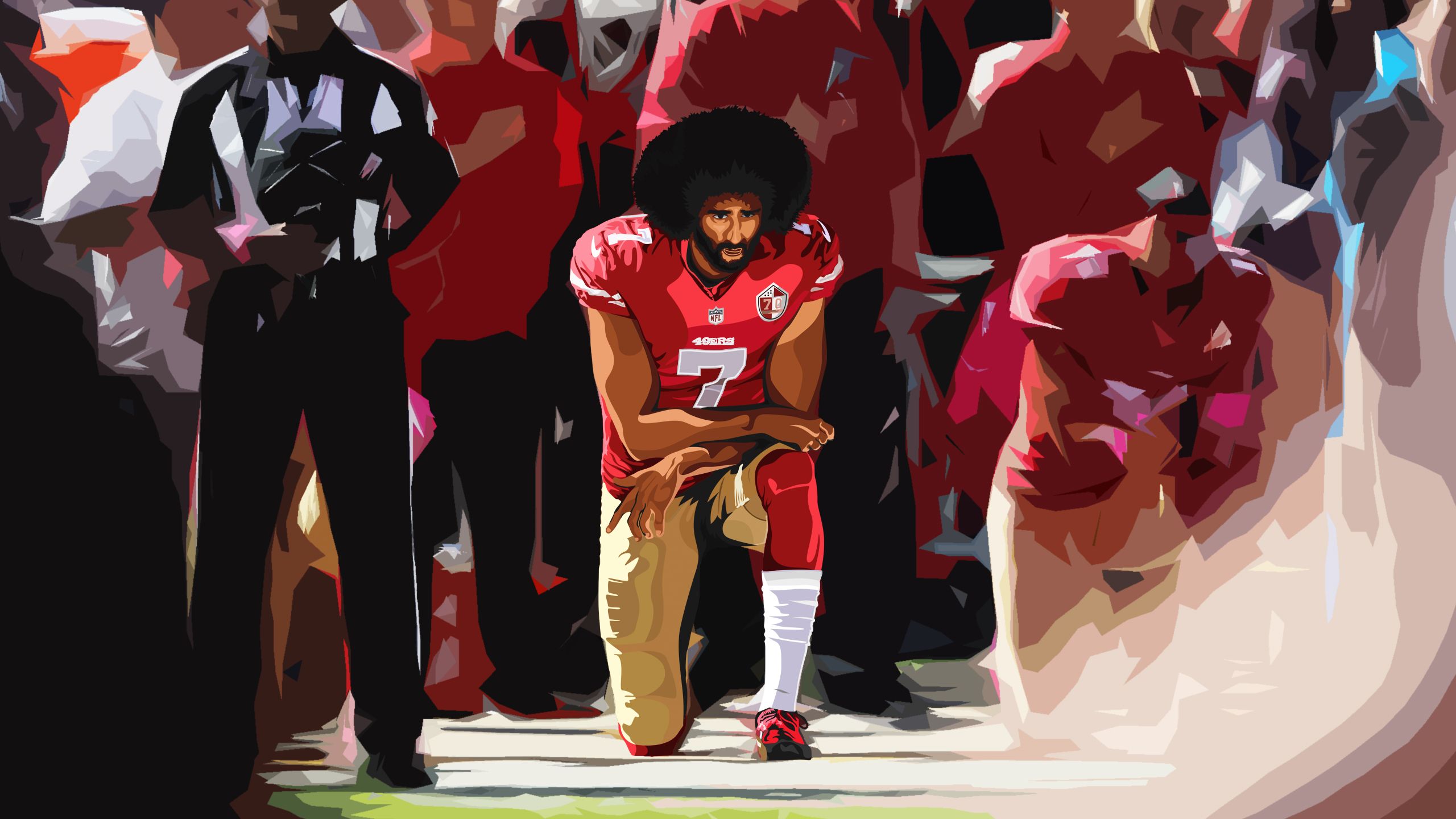
In August 2016, San Francisco 49ers quarterback Colin Kaepernick began kneeling during pre-game national anthems to protest about racial injustice and police brutality.
His actions made headlines around the world, attracted criticism from the president of the United States, and eventually left him without a team.
Four years on, sport in the US came to a standstill last week following the shooting of Jacob Blake.
Blake, a black man, was shot seven times in the back by police in Kenosha, Wisconsin.
Since the death of George Floyd in May, protests in support of the Black Lives Matter movement have become the norm in sports around the world. In June, the NFL said it had been "wrong for not listening to players earlier" and encouraged "all to speak out and peacefully protest".
It is now the sport stars who don’t 'take a knee' that make the headlines.
You’d be forgiven for thinking this all began with Kaepernick. His protests are synonymous with the Black Lives Matter movement, and he will go down in history as the man who brought awareness to a global sporting audience.
But athletes, including some of the world's biggest names, have been using their platform to support it – and protest against police brutality – since 2012.
Behind each powerful moment of protest is the death of a black man, woman or child.
Here we look at some of the key protests, and the deaths that led to them. This is the story of sport in the Black Lives Matter movement.
Trigger warning: includes police brutality and violence.
26 February 2012
Seventeen-year-old Trayvon Martin was shot dead in Sanford, Florida.
Martin was walking home from a convenience store, where he had bought some sweets and a drink. George Zimmerman, a member of the neighbourhood watch, saw Martin and called the police to report him as suspicious.
After the call, there was a physical altercation between the two, and Zimmerman fatally shot Martin in the chest.
Zimmerman, who had been injured during the encounter, claimed he shot out of self-defence. In the absence of witnesses contradicting his account, Zimmerman was not arrested until six weeks later, following mass protests across the United States.
Zimmerman had been in trouble with the law before. In 2005, he was arrested and accused of resisting an officer with violence in Florida after a scuffle with police. A month later, his former fiancee filed a restraining order against him, alleging domestic violence. No charges were filed in either incident.
He was also arrested and charged with domestic aggravated assault against his girlfriend in 2013 and 2015. Both times charges were dropped.
In 2016, Zimmerman announced he was auctioning off the gun he used to shoot Martin. He sold it for $250,000 (£172,000).
23 March 2012
Before a game against the Detroit Pistons, Miami Heat star LeBron James tweeted: "#WeAreTrayvonMartin #Hoodies #Stereotyped #WeWantJustice." The tweet included a photograph of 13 members of the team posing in hoodies, heads bowed.
When Zimmerman had called the police to report Martin, he repeatedly mentioned he was wearing a hoodie. It became a symbol of his death, and people wore hoodies during protests.
When the Heat faced the Pistons, James and team-mate Dwyane Wade wrote "RIP Trayvon Martin" and "We want justice" on their trainers. On the night of Martin's death they had been just a few miles away from Sanford - playing in the NBA All-Star game in Orlando.
In July 2013, a jury acquitted Zimmerman of second-degree murder and manslaughter - and the Black Lives Matter movement began as a hashtag on social media.
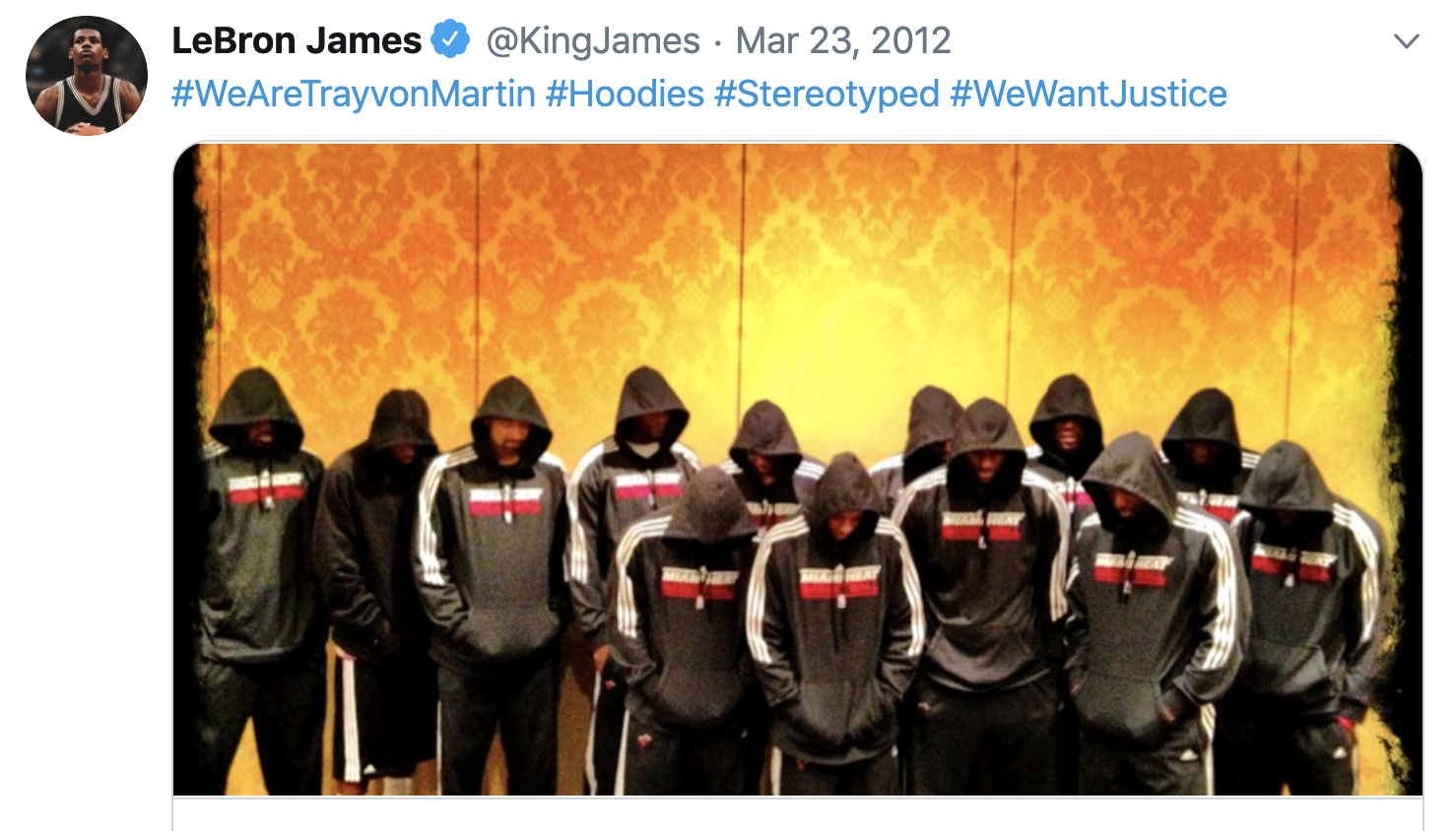
9 August 2014
Eighteen-year-old Michael Brown was shot and killed in Ferguson, Missouri.
Brown and his friend Dorian Johnson were at a local convenience store, where CCTV footage released later showed Brown stealing cigars.
Police officer Darren Wilson received an alert in his patrol car. Shortly afterwards, he stopped Brown and Johnson for walking in the middle of the road.
A scuffle ensued between Brown and the officer. Wilson said Brown attempted to grab his gun, but witnesses say that did not happen. Wilson fired two shots. One hit Brown's hand, and he ran away. Wilson chased him.
What happened next is unclear. Some witnesses said Brown put his hands up in surrender. Wilson said Brown charged towards him.
Wilson fired more shots - 12 across the whole incident. Six hit Brown, who was unarmed.
Two days later, the FBI opened a civil rights investigation into Brown's death.

On 4 March 2015, the FBI investigation cleared Wilson of civil rights violations, concluding there wasn't enough evidence for prosecutors to disprove his claim he feared for his safety. It also concluded witnesses who contradicted Wilson's account were not credible, and that forensic evidence and credible witnesses had corroborated it.
Brown's death sparked the 'Ferguson unrest' - weeks of protests in the city - and national debate around police treatment of African-Americans.
It also spawned the 'Hands up don't shoot' pose that became a symbol of protests against police brutality.
In July 2020, prosecutors in the US city of St Louis said they will not bring charges against Darren Wilson, stating that a five-month re-examination of the case had not found enough evidence to bring charges of murder or manslaughter against him.
29 November 2014
Student Ariyana Smith played basketball for Knox College, Illinois. On this day, they faced Fontbonne in Clayton, Missouri.
Five days earlier, a grand jury in Clayton had decided not to indict Wilson. Smith decided she had to do something.
While the national anthem played before the game, Smith walked on to the court with her hands raised in the 'hands up don’t shoot' pose.
She then walked up to the American flag and knelt. On the last line of the anthem, she fell to the floor and stayed there for four and a half minutes. She was asked repeatedly to get up, but the four and a half minutes represented the four and a half hours Brown's body had lain in the street after he was killed.
When she eventually stood up, she made the Black Power salute - and walked out of the gym.
Smith was suspended from the team. That decision was later reversed, but she decided not to rejoin them.
By now, the Black Lives Matter movement had become nationally and internationally recognised.
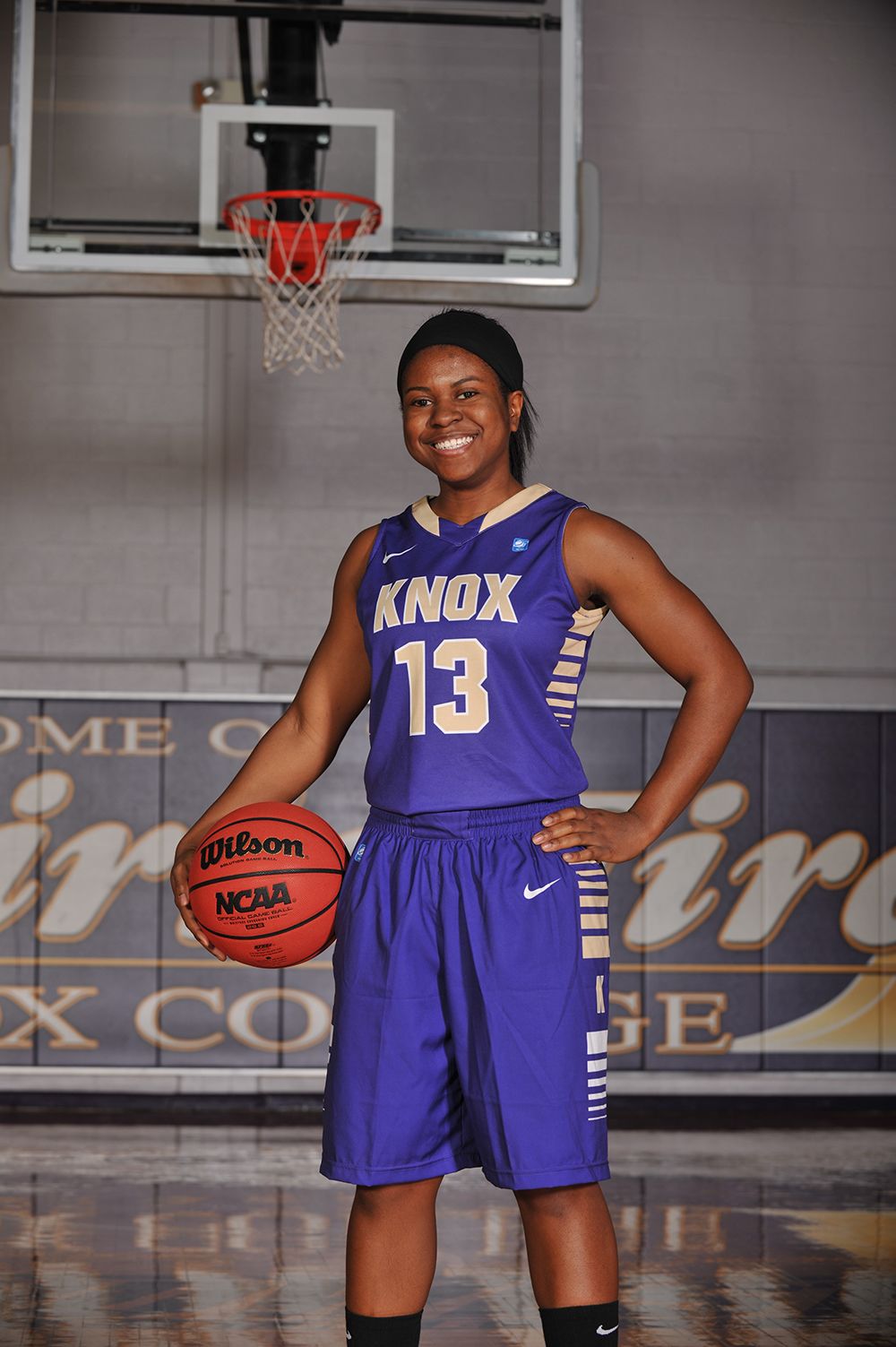
"Looking back at that moment it was definitely very emotionally charged," Smith told BBC Sport. "I was like: 'OK, I'm taking off my jersey, I'm shedding this uniform that has in a lot of ways protected me, given me status, given me a lot of influence... but I'm taking this off.'
"I think there's been tremendous work going on since Trayvon Martin's death in 2012. That was a pivotal moment for the movement. Since then, we've been consistent and clear with what we're asking for. The bare bones were there at the beginning but now we're being more precise with our tactics and our asks.
"I’ve always been inspired and wondered, 'If I lived during the Civil Rights Movement, who would I have been?' And I think we're able to answer those questions now, because this is the moment for our generation.
"I clearly remember the moment in my childhood when I saw the picture of Tommie Smith and John Carlos at the 1968 Olympics. I just remember thinking, 'Whoa!' It was just a moment of awe. I thought, 'I'm so proud of them, I'm so happy that they did that.' That was an image that really stuck with me, subconsciously. It was one of those things that I really absorbed."
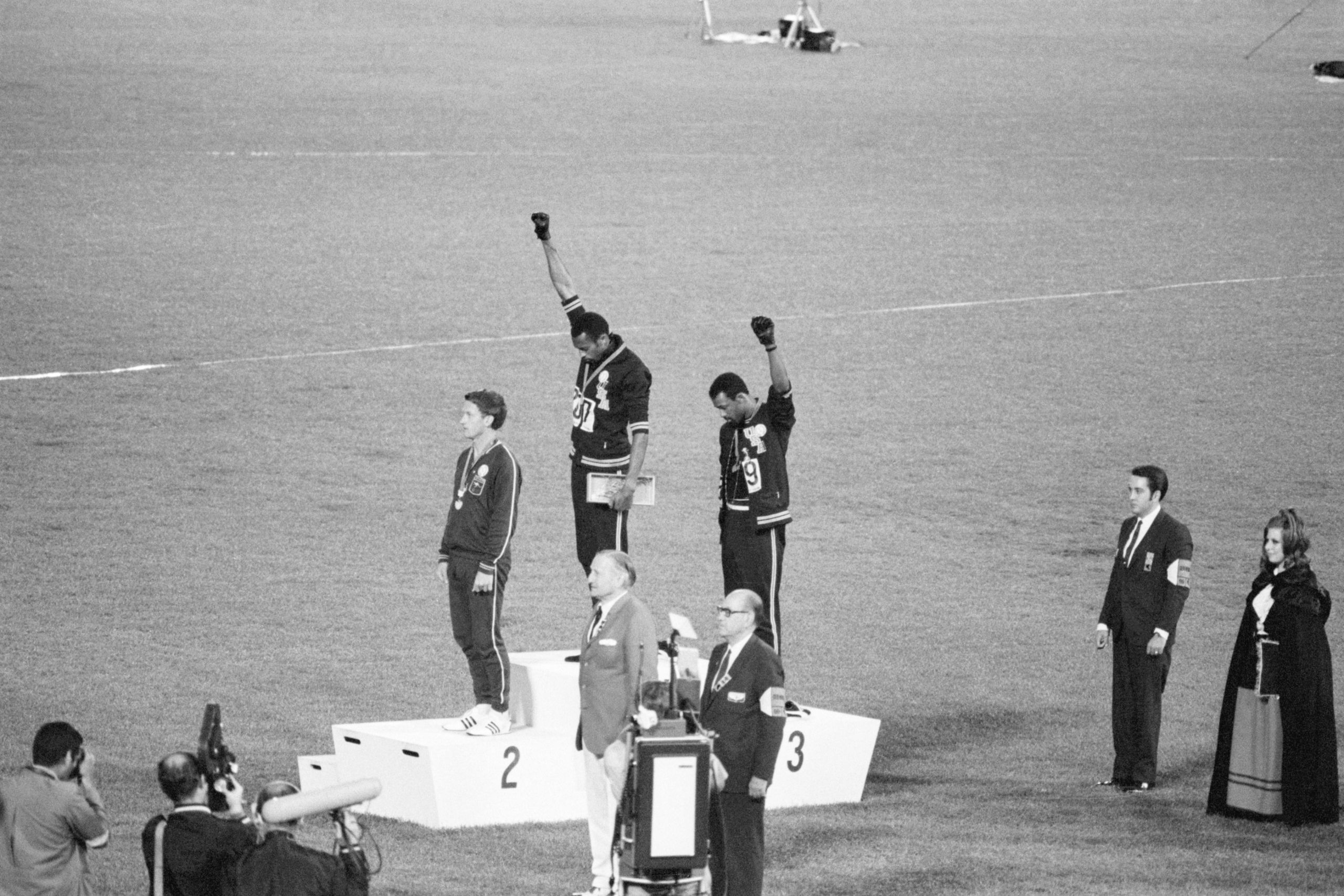
A day later, the St Louis Rams were playing the Oakland Raiders in the NFL. Several Rams players entered the field making the 'hands up don't shoot' gesture.
The St Louis Police Officers' Association asked the NFL to punish the players, claiming their actions had been "way out of bounds".
The SLPOA said it was "profoundly disappointed with the members of the St Louis Rams football team who chose to ignore the mountains of evidence released from the St Louis County grand jury this week and engage in a display that police officers around the nation found tasteless, offensive, and inflammatory".
Rams coach Jeff Fisher said he had not been aware of the players' plans, but that they were exercising their right to free speech.
They were not punished by the NFL. Its vice-president of communications, Brian McCarthy, said: "We respect and understand the concerns of all individuals who have expressed views on this tragic situation."
17 July 2014
Officers from the New York City Police Department approached horticulturist and father of six Eric Garner, suspecting him of selling single cigarettes from packs without tax stamps on Staten Island. Garner told them he wasn't selling cigarettes, and was tired of being harassed by the police.
As officer Daniel Pantaleo attempted to arrest Garner, he pulled away. Pantaleo wrestled Garner to the ground by grabbing his neck.
In the struggle to restrain him, which was videoed by an onlooker with a mobile phone, Pantaleo kept Garner's head held down. Garner repeated the words "I can't breathe" 11 times while lying face down on the pavement. After Garner lost consciousness, he lay on the pavement for seven minutes while the police waited for an ambulance to arrive. He was pronounced dead at hospital an hour later.
The city medical examiner found Pantaleo's hold had caused his death and ruled it a homicide.
On 3 December, after two months of deliberating, a grand jury said Pantaleo would not be charged over Garner's death. The decision prompted outrage across the US, and Garner's last words - "I can't breathe" - became the rallying cry of protesters in New York.
Pantaleo was eventually fired in 2019, five years after Eric Garner was killed. The decision, based on the recommendation of a police department disciplinary judge, was announced by New York Police Commissioner James O'Neill who said mobile phone footage of Garner's death clearly shows Pantaleo using a chokehold, which is banned by the New York Police Department.
8 December 2014
By now, LeBron James was playing for the Cleveland Cavaliers. While warming up for a match against the Brooklyn Nets in New York, he, Kyrie Irving and several other team-mates wore T-shirts bearing the phrase 'I can't breathe'.
Nets players Jarrett Jack and Kevin Garnett did likewise, as did Chicago Bulls player Derrick Rose before facing the Golden State Warriors.
Before the game in Brooklyn, protesters had gathered around the Nets' Barclays Center, on the sixth night of protests in New York City.
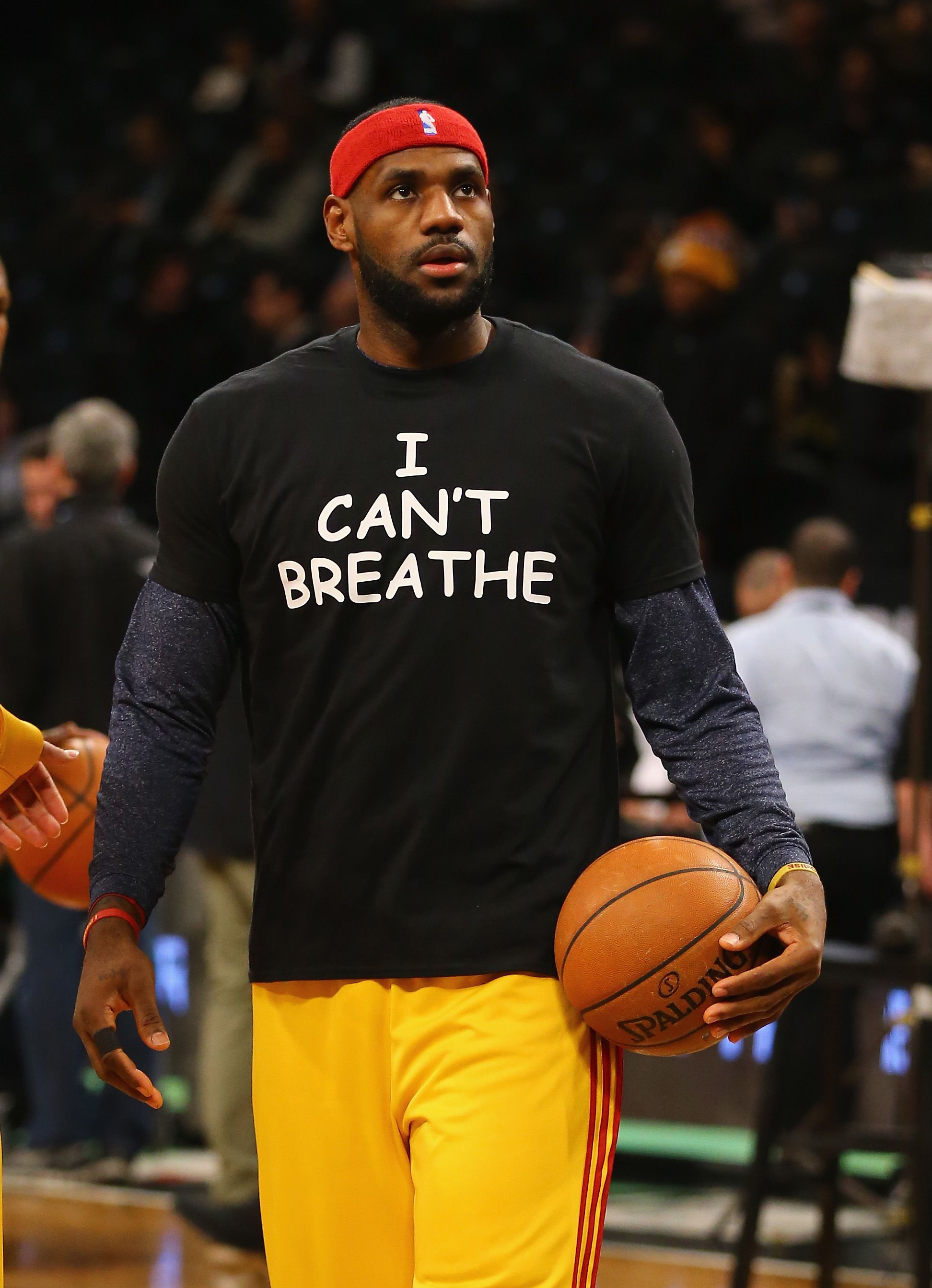
The following day, on the opposite side of the country, LA Lakers legend Kobe Bryant wore an 'I can't breathe' T-shirt before a game against the Sacramento Kings at the Staples Center.
He was joined by team-mates including Jeremy Lin, Carlos Boozer and Nick Young.
After the game, Bryant said: "I think it would be a serious disservice to limit this to a race issue. It's a justice issue.
"You're kind of seeing a tipping point right now, in terms of social issues. It's become at the forefront right now as opposed to being a local issue.
"The beauty of our country lies in its democracy. I think if we ever lose the courage to be able to speak up for the things that we believe in, I think we really lose the value that our country stands for.
"It's important that we have our opinions, it's important that we stand up for what we believe in. We all don't have to agree with it, and that's completely fine, that's what makes this a beautiful country."
Two days later, Sacramento Kings players Rudy Gay, Ramon Sessions and Eric Moreland wore the same T-shirts during the national anthem before a game against the Houston Rockets.
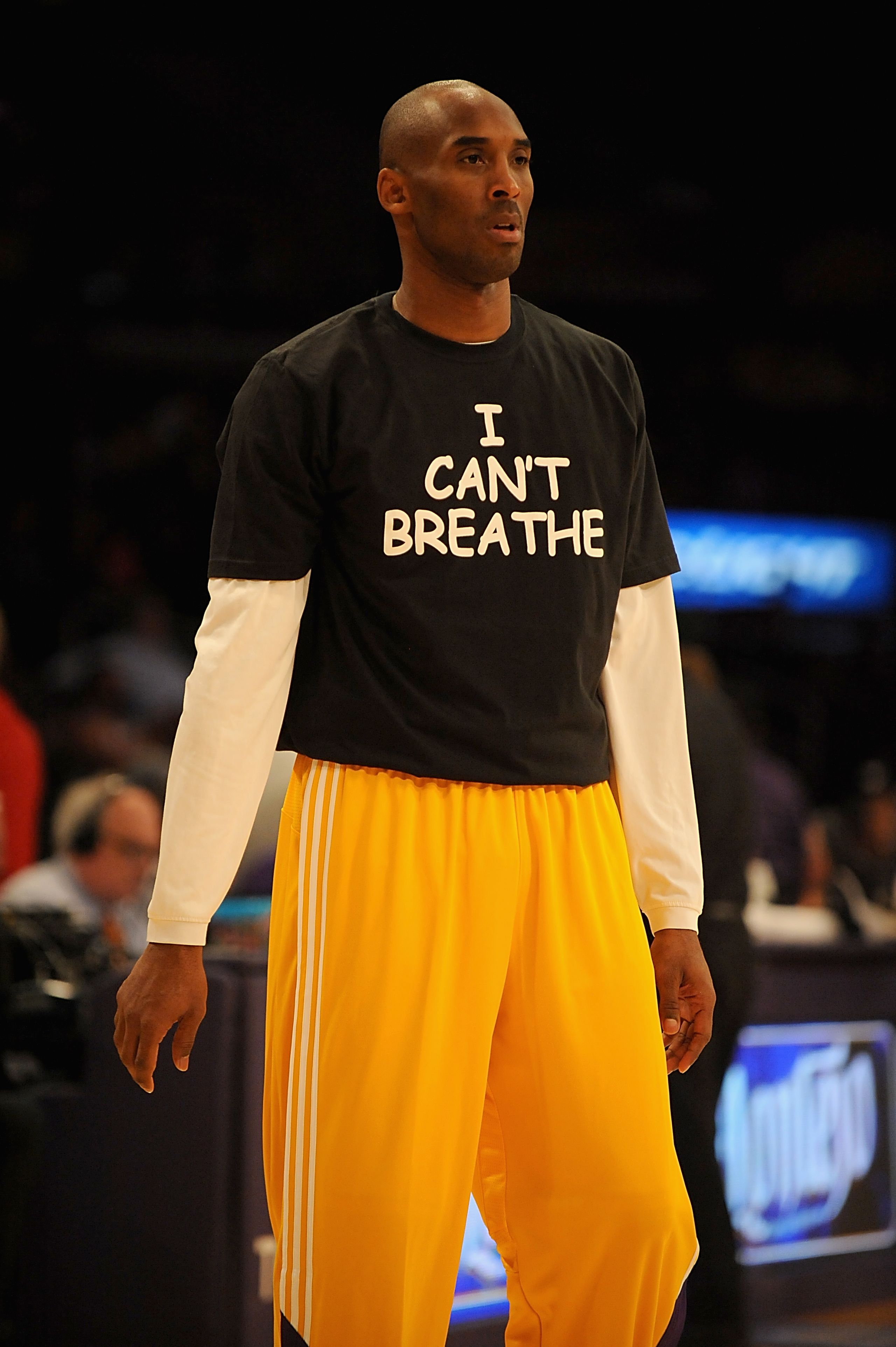
22 November 2014
Two officers responded to a call in which it was claimed a male was pointing a gun at people in a park in Cleveland, Ohio. The male was 12-year-old Tamir Rice, who was playing with a plastic gun.
Police officer Timothy Loehmann arrived at the park and, within two seconds, shot Rice twice. He died the next day.
Several months later, the county prosecution team presented evidence to a grand jury, which declined to bring charges on the basis Rice was drawing what the officers thought was a real gun from his waistband when they arrived.
It was later revealed Loehmann had been deemed unfit for duty and emotionally unstable while at another police department. He did not disclose that on his application to join the Cleveland police, who did not review his previous personnel file before hiring him. Loehmann was sacked in 2017 for not disclosing the information.
14 December 2014
Prior to an NFL game between the Cleveland Browns and the Cincinnati Bengals, Browns wide receiver Andrew Hawkins wore a T-shirt that had 'Justice for Tamir Rice and John Crawford III' on the front and 'The real battle of Ohio' on the back.
Crawford, a 22-year-old African-American man, had been shot and killed by a police officer in a Walmart store in Ohio in August 2014. He had picked up a BB gun that was for sale in the shop and another customer, Ronald Ritchie, called 911, claiming Crawford was pointing the gun at people.
A month after Crawford was killed, and after security footage was released, Ritchie recanted his statement and said Crawford never pointed the gun at anyone.
Jeff Follmer, the president of Cleveland's police union, criticised Hawkins for wearing the "pathetic" T-shirt, said he should concentrate to playing football, and demanded an apology from the Browns.
In a statement, Hawkins said:
“My wearing of the T-shirt was a stance against wrong individuals doing the wrong thing for the wrong reason to innocent people. If I was to run away from what I felt in my soul was the right thing to do, that would make me a coward and I couldn't live with that.”
Hawkins also spoke of his fear for his two-year-old son.
"That little boy is my world. My number one reason for wearing the T-shirt was the thought of what happened to Tamir Rice happening to my little Austin. And that scares the living hell out of me."
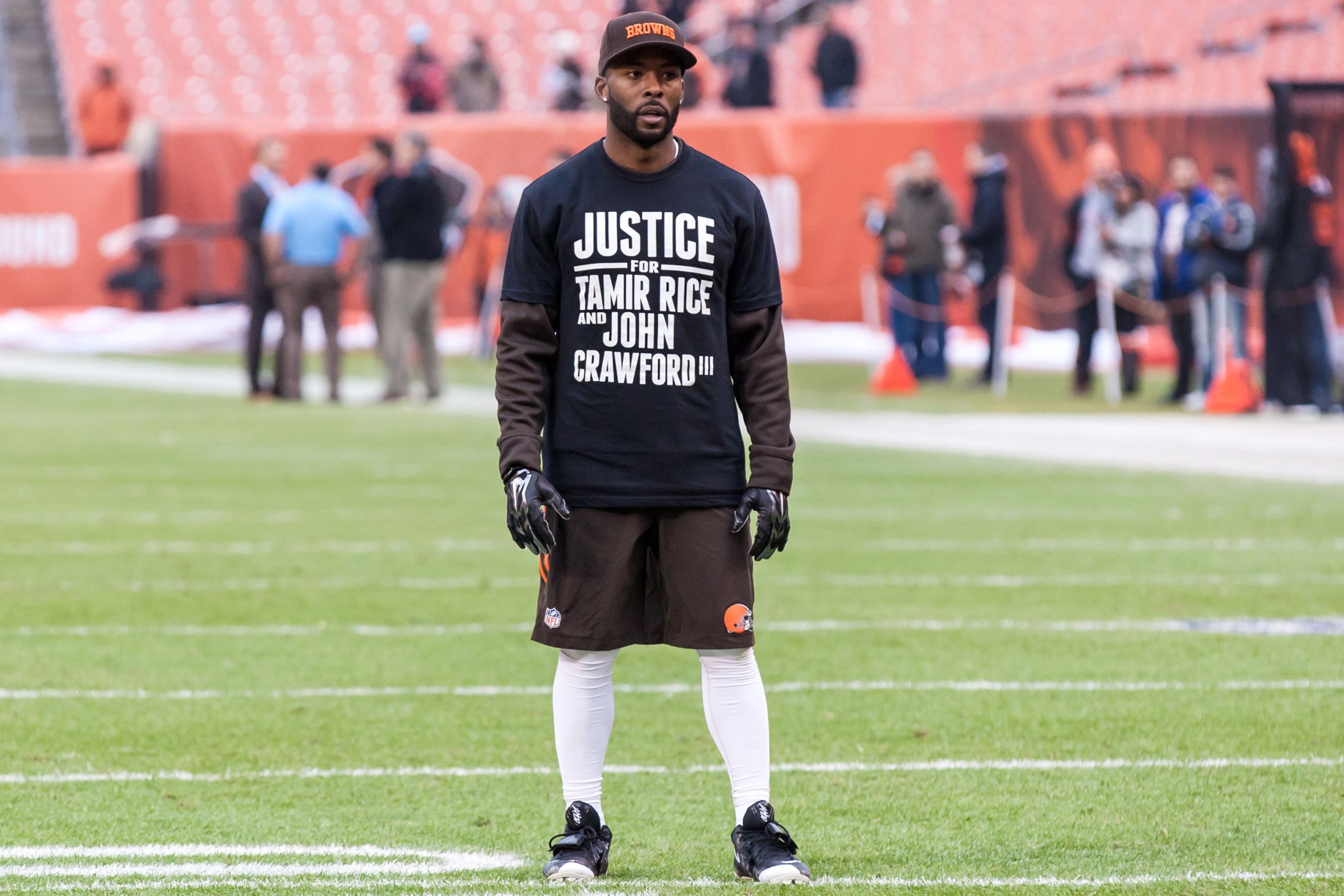
5 July 2016
Two officers responded to reports of a man threatening people with a gun outside a grocery shop in Baton Rouge, Louisiana. At first, they used non-lethal methods (including a stun gun) to subdue Alton Sterling, who was selling CDs. He was then shot dead as he tried to pull a loaded gun from his pocket, according to police.
Officer Blane Salamoni shot Sterling while colleague Howie Lake helped pin him down. Footage of the shooting quickly went viral.
Toxicology and urine test results released in March 2018 showed Sterling tested positive for cocaine, methamphetamine, opioids and other drugs at the time of his death, according to a report released by Louisiana Attorney General Jeff Landry. The state prosecutor said the results could indicate "Sterling was under the influence and that contributed to his noncompliance".
The report also revealed Sterling had been shot six times, including three times in the chest. Landry said the officers acted reasonably under "existing law and were justified in their use of force".
The owner of the shop where Sterling was shot said the 37-year-old had started carrying a gun a few days earlier, as other CD sellers in the area had recently been robbed. But he said Sterling was not causing trouble before police were called.
Sterling's death led to protests in Baton Rouge, as well as a request for a civil rights investigation by the Department of Justice. Neither Salamoni nor Lake faced any criminal charges.
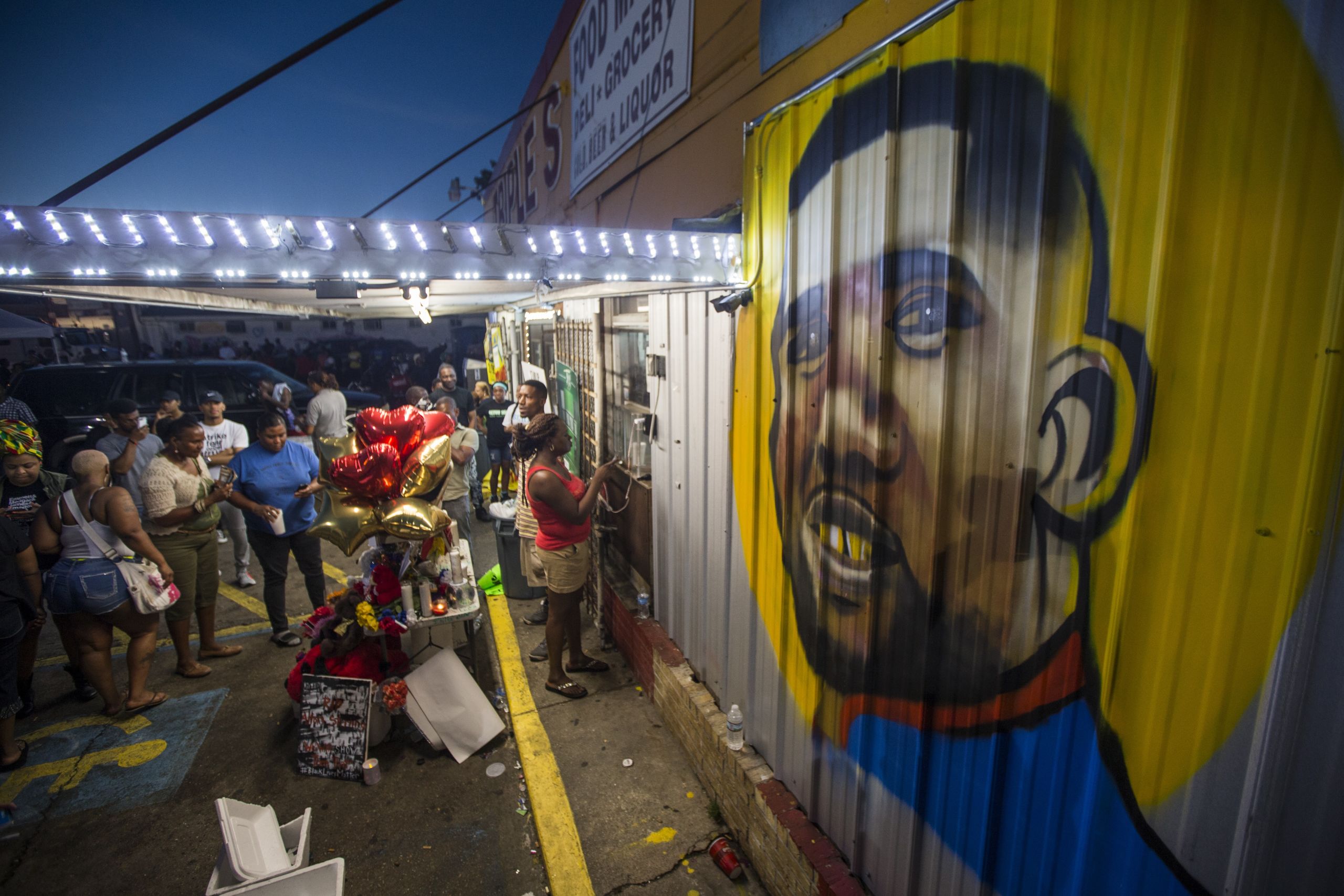
A day after Sterling was shot - and more than 1,000 miles north in Falcon Heights, Minnesota - 32-year-old Philando Castile was killed by a police officer during a traffic stop.
Castile, who had his girlfriend and her four-year-old daughter in the car, was initially stopped because one of his brake lights was out.
Police dashcam footage that was later released showed a calm encounter between Castile and officer Jeronimo Yanez that escalated quickly.
Castile handed Yanez his ID and said: "Sir, I have to tell you, I do have a firearm on me." He was licensed to carry the gun. Yanez told Castile not to reach for it, and Castile told him several times he was not doing so. Yanez shot Castile seven times at close range.
The aftermath of the shooting was live-streamed on Facebook by Castile's girlfriend.
Almost a year later, Yanez was found not guilty on charges of second-degree manslaughter and two felony counts of intentional discharge of a dangerous weapon, for endangering the safety of Castile's girlfriend and her daughter.
In Alton Sterling's case, Blane Salamoni was dismissed in 2018 for violating department standards on the use of force and for losing his temper.
In 2017, a civil lawsuit for wrongful death concluded with the news that Valerie Castile, Philando Castile's mother, would receive $3m (£2.4m) from the city of St Anthony.
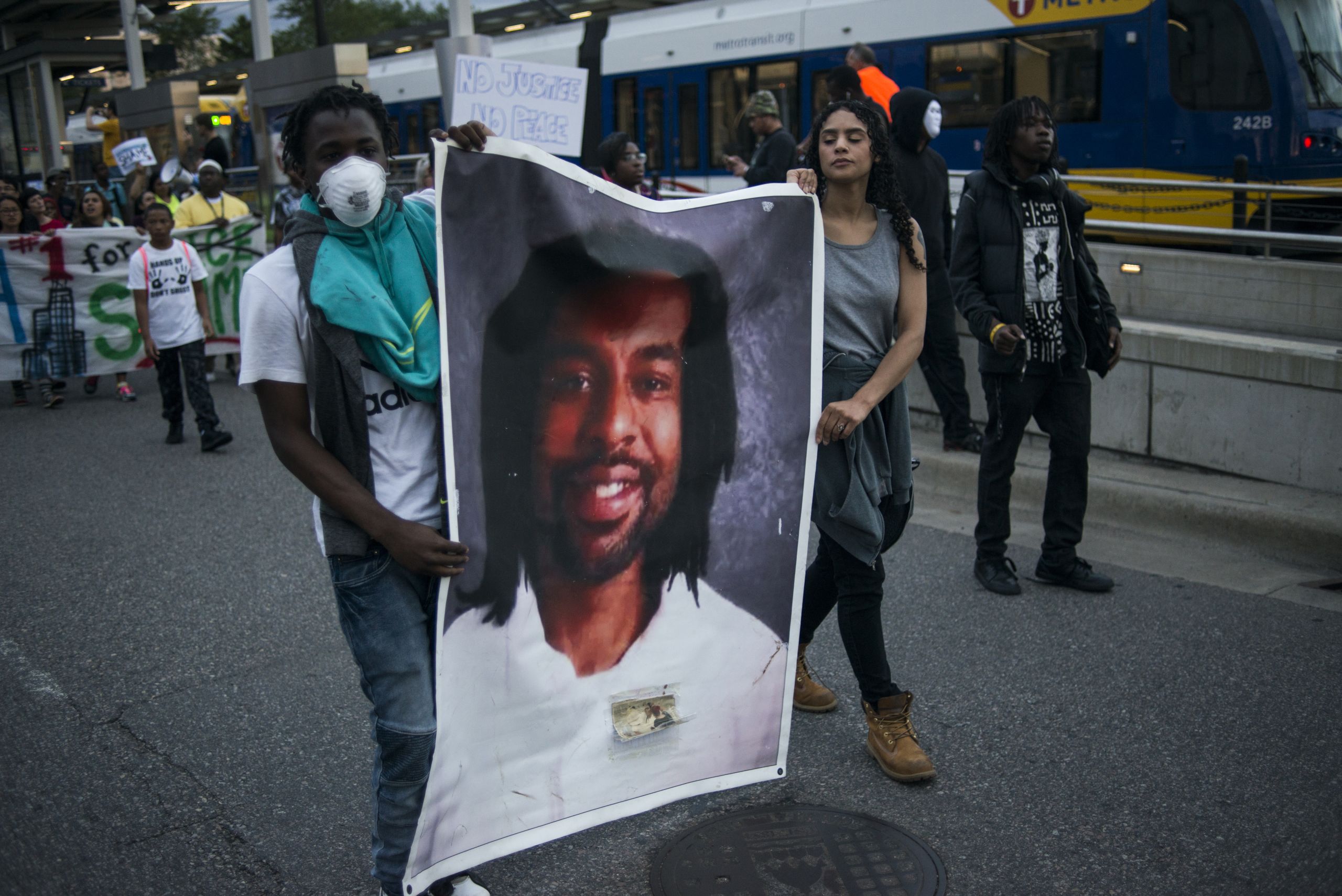
9 July 2016
During the warm-up before a home match against the Dallas Wings, several members of the Minnesota Lynx WNBA team wore Black Lives Matter T-shirts. The names Alton Sterling and Philando Castile were printed on the back.
The players (Lindsay Whalen, Maya Moore, Rebekkah Brunson and Seimone Augustus) were each fined $500 (£380) by the league. The Lynx - as well as other teams who protested, including the New York Liberty and the Phoenix Mercury - were fined $5,000.
The Lynx tweeted photos of the players, along with this quote from Moore:
"This is a human issue and we need to speak up for change, together."
Moore, the team's captain at the time, also made a statement.
"We as a nation can decide to stand up for what is right no matter your race, background or social status," she said. "It is time that we take a deep look at our ability to be compassionate and empathetic to those suffering from the problems that are deep within our society."
New York Liberty's Tina Charles tweeted that she refused to be silent, and WNBA president Lisa Borders subsequently rescinded the fines.
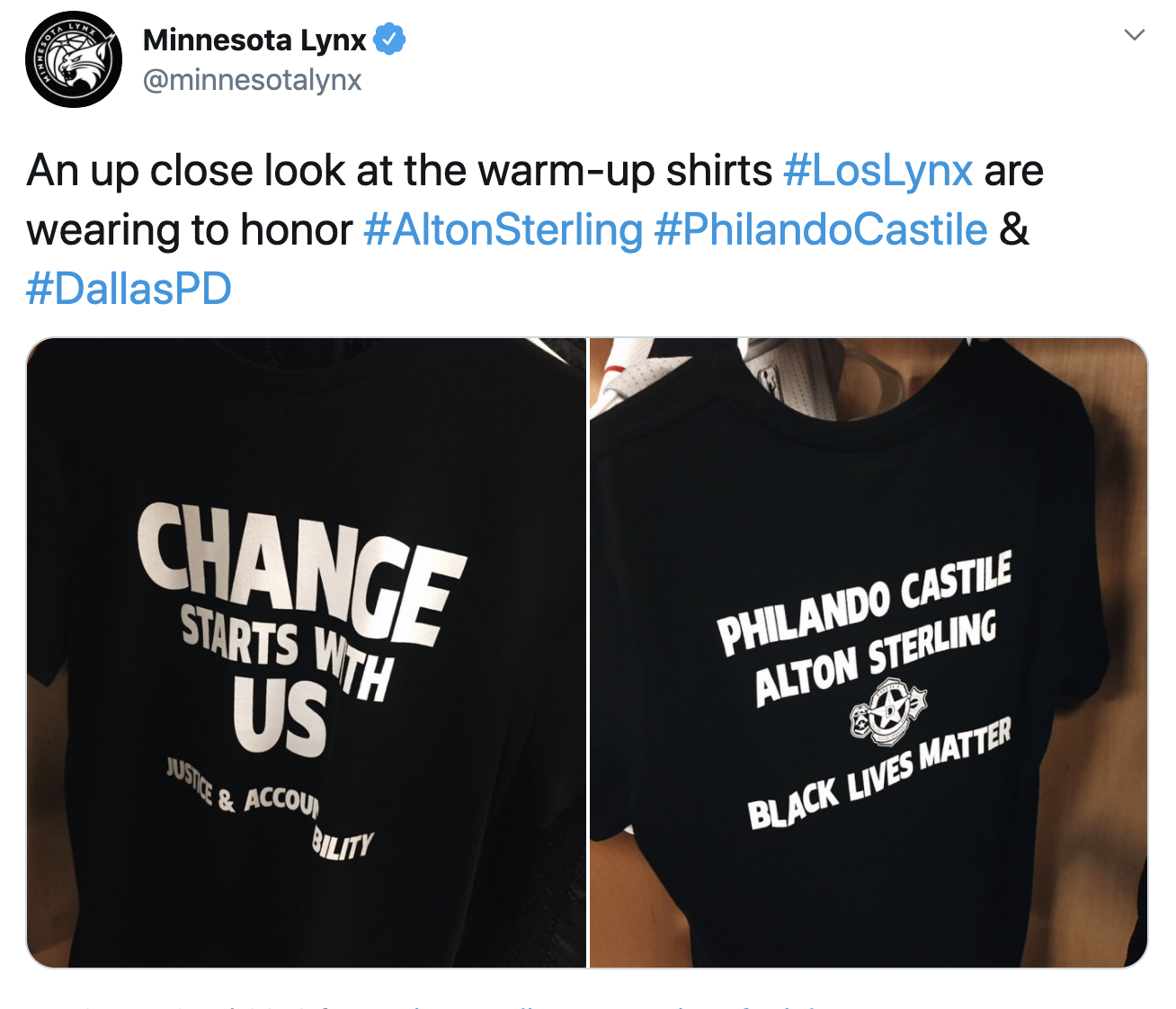
26 August 2016
In the San Franciso 49ers' third pre-season game in 2016, Colin Kaepernick sat on the bench during the national anthem.
Kaepernick, a 28-year-old quarterback from California who had led the 49ers to the 2013 Super Bowl, was protesting against racial injustice and police brutality in the US.
He had done it in previous pre-season games, but the media hadn't picked up on it. This time they did.
Kaepernick said: "I am not going to stand up to show pride in a flag for a country that oppresses black people and people of colour. To me, this is bigger than football and it would be selfish on my part to look the other way. There are bodies in the street and people getting paid leave and getting away with murder."
The reaction across the US was huge. Some applauded Kaepernick's stance. Others viewed his gesture as disrespectful and unpatriotic.
Donald Trump - then the Republican presidential candidate - said: "I think it's a terrible thing, and you know, maybe he should find a country that works better for him."
Angry fans of the 49ers began posting videos of themselves burning Kaepernick jerseys.
In a tweet that has since been deleted, 49ers legend Jerry Rice took a similar line to many, backing Kaepernick's freedom to express himself while disagreeing with the method.
He tweeted: "All lives matter. So much going on in this world today. Can we all just get along! Colin, I respect your stance but don't disrespect the flag!"
But there were others with different views. Tommie Smith, the US sprinter who famously raised his fist in the Black Power salute during his medal ceremony at the 1968 Olympic Games, backed Kaepernick.
"He's being vilified in how he brings the truth out," he told USA Today.
"I support him because he's bringing the truth out, regardless of how [it's] done. If it's not done violently, at least he should be heard.
"There are a lot of battles to fight because it's a big, long war."
Smith would later tell BBC Sport he "cried when Kaepernick took the knee".
1 September 2016
The 49ers were playing their final pre-season game against the San Diego Chargers.
Kaepernick knelt during the national anthem. He said the decision to kneel rather than sit was an attempt to show more respect to US military members.
Team-mate Eric Reid joined him, and the pair were booed by people in the crowd. After the game, Kaepernick said he loved America.
"The message is that we have a lot of issues in this country that we need to deal with," said Kaepernick, who two days earlier had pledged to donate $1m (£753,000) to community organisations.
"We have a lot of people that are oppressed. We have a lot of people that aren't treated equally, that aren't given equal opportunities."
On the same day, in another part of California, Seattle Seahawks cornerback Jeremy Lane sat for the anthem before their game against the Oakland Raiders.
He said: "It's something I plan to keep on doing until justice is served."
Throughout September 2016, the protests spread across the NFL, from the west to east coast of the US. In the first week of the season, 11 players protested.
And it started happening outside the NFL too - World Cup-winning footballer Megan Rapinoe knelt during the anthem before a NWSL match on 5 September 2016.
She knelt again 10 days later, this time before the US faced Thailand in a friendly.
In an interview with American Soccer Now, Rapinoe said: "I think it's actually pretty disgusting the way [Kaepernick] was treated and the way that a lot of the media has covered it and made it about something that it absolutely isn't.
"We need to have a more thoughtful, two-sided conversation about racial issues in this country."
Barack Obama, then US President, also defended Kaepernick.
He said: "He's exercising his constitutional right to make a statement. I think there is a long history of sports figures doing so. I think there are a lot of ways you can do it when it comes to the flag and national anthem."
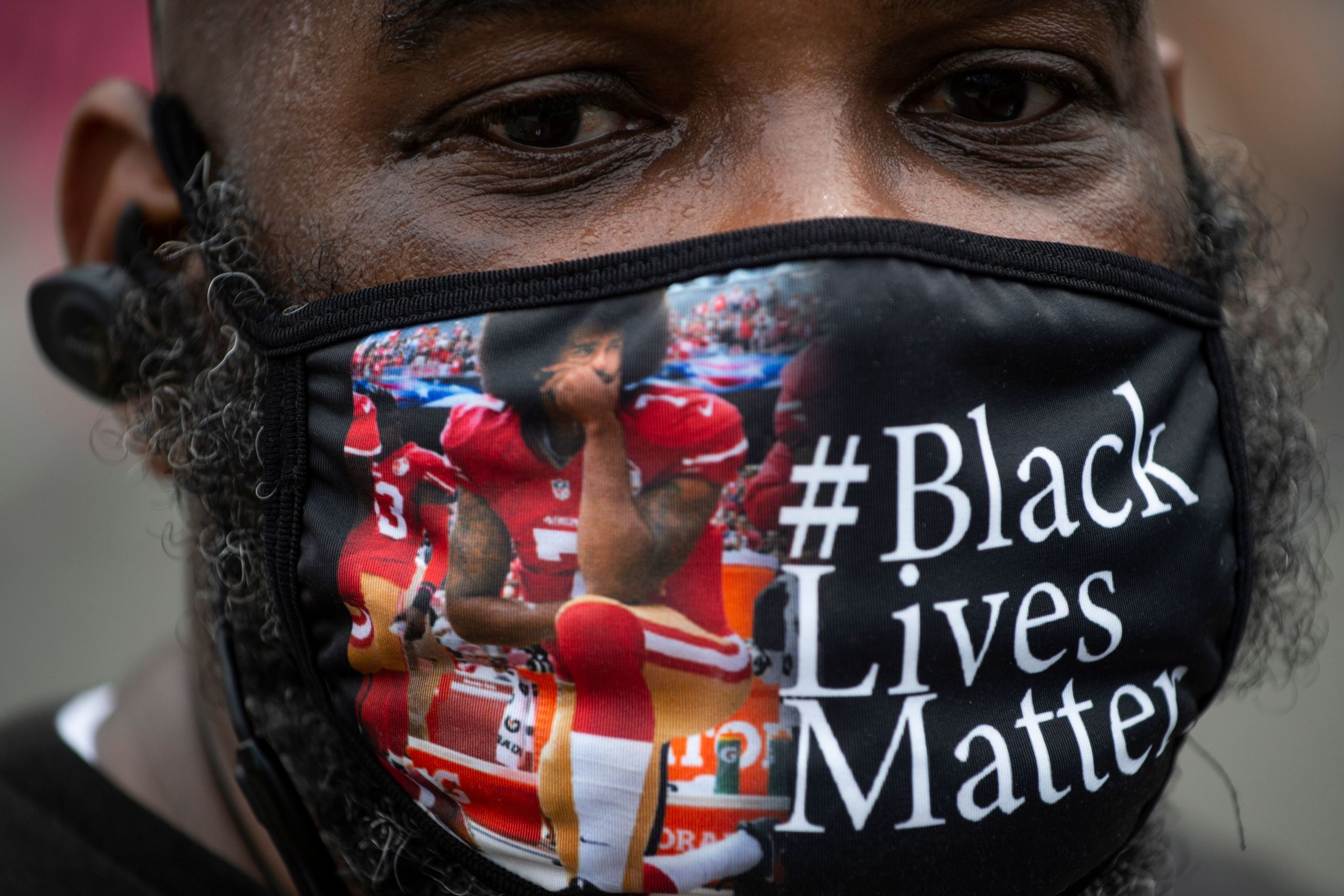
A week later, Trump said Kaepernick and any other players protesting during the anthem should leave the country.
"I think it's a great lack of respect and appreciation for our country," he said. "They should try another country, see if they like it better. See how well they'll be doing. See if they are going to be making $20m being a second-string quarterback."
On 27 September, Kaepernick responded:
"He always says 'make America great again'. Well America has never been great for people of colour. That's something that needs to be addressed. Let's make America great for the first time."
By the beginning of October 2016, Kaepernick was on the cover of Time magazine.
In March 2017, Kaepernick's agent told NFL teams he would opt out of his 49ers contract, a move made possible in a restructuring of his contract the previous October. Seven months later he was still unsigned and filed a grievance against NFL team owners, who he said were conspiring not to hire him.
The protests were still happening. And when Trump, now the president, encouraged a boycott, they really reached their peak.
On 22 September, at a rally in Alabama, Trump said owners of NFL teams should fire players who knelt during the anthem, claiming they were "ruining the game".
"That's a total disrespect of our heritage," he said. "That's a total disrespect of everything that we stand for. Wouldn't you love to see one of these NFL owners, when somebody disrespects our flag, you'd say: 'Get that son of a bitch off the field right now. Out! He’s fired.'"
A sea of protests across the NFL followed, and #TakeAKnee was in 1.2 million tweets in the space of three days.
Players from the Seattle Seahawks, the Tennessee Titans, the Pittsburgh Steelers, the Chicago Bears, the Green Bay Packers, the Cincinnati Bengals, the New England Patriots, the Detroit Lions, the Atlanta Falcons and the Jacksonville Jaguars all protested.
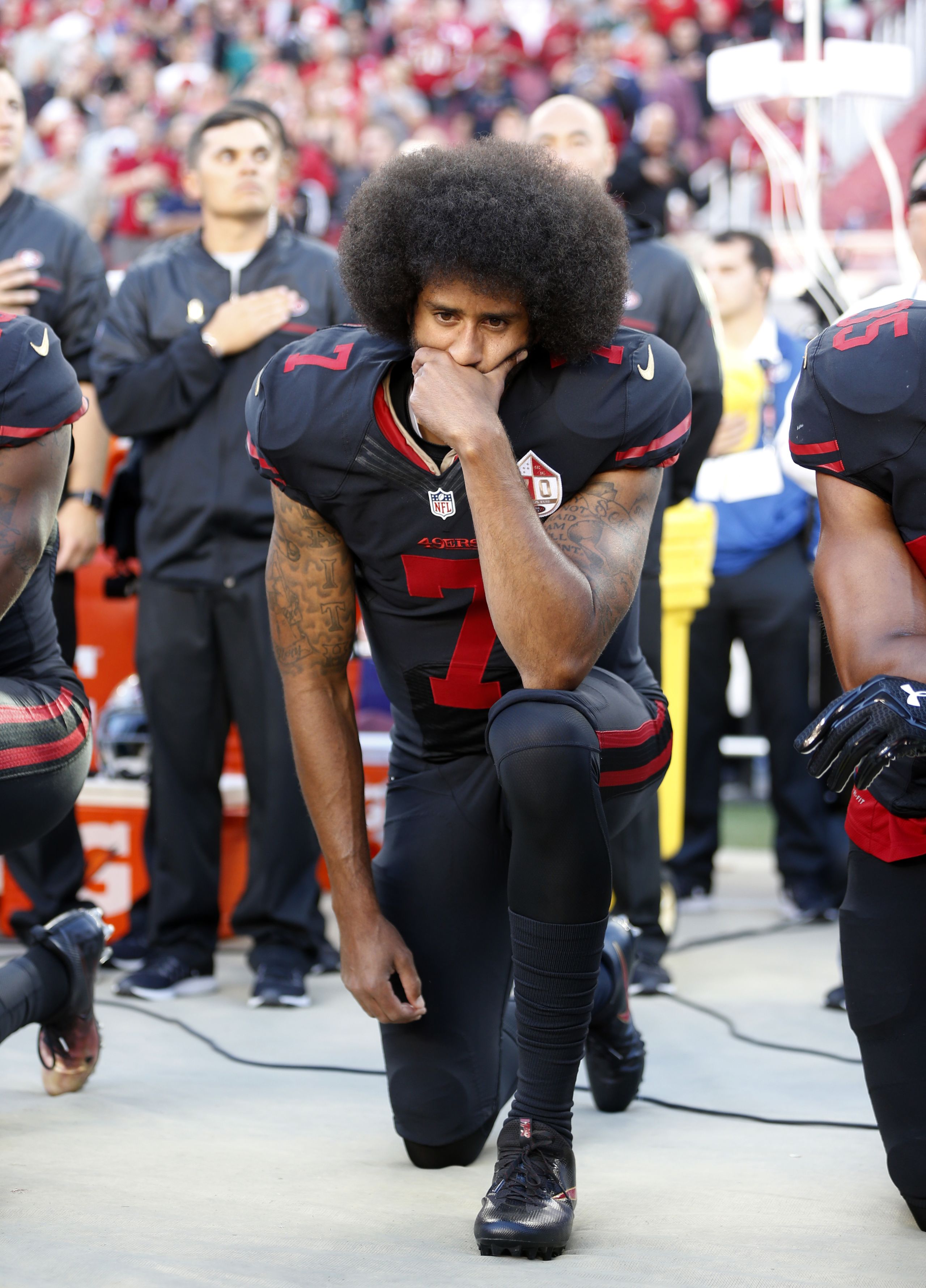
In March 2018, the NFL introduced a new rule that meant teams would be fined if players knelt for the anthem. They were given the option of staying in the locker room until it finished.
By 2019, only three players were still protesting - Kenny Stills from the Houston Texans, Albert Wilson of the Miami Dolphins, and the Carolina Panthers' Eric Reid, who had originally 'taken a knee' alongside Kaepernick three years earlier.
In February, Kaepernick reached a settlement with the NFL over his 'collusion' case against team owners.
In October 2019, singer Rihanna said she declined an invitation to headline the Super Bowl half-time show in support of Kaepernick. The NFL refused to comment.
Kaepernick still had no team.
2020
After the death of George Floyd on 25 May 2020, protests in support of the Black Lives Matter movement became an everyday occurrence around the world and across sports.
The protests have since turned into boycotts after the shooting of Jacob Blake, a black man who was shot seven times in the back by police on 23 August in Kenosha, Wisconsin near Milwaukee.
The Milwaukee Bucks called off their game against the Orlando Magic on 26 August, exactly four years since Kaepernick's protests were first noticed by the media. Bucks players released a statement that said: "Despite the overwhelming plea for change, there has been no action, so our focus today cannot be on basketball.
"When we take to the court and represent Milwaukee and Wisconsin, we are expected to play at a high level, give maximum effort and hold each other accountable.
"We hold ourselves to that standard, and in this moment, we are demanding the same from our lawmakers and law enforcement. We are calling for justice for Jacob Blake and demand the officers be held accountable."
The NBA, WNBA, NHL, MLS and MLB have since postponed games. Japanese tennis player Naomi Osaka pulled out of her Western and Southern Open semi-final in New York.
On 27 August, WNBA players from the Atlanta Dream and Washington Mystics protested against the shooting of Blake by wearing T-shirts with holes in them representing how many times he was shot by police.
For many, Colin Kaepernick remains the face of the 'Take a Knee' campaign. His persistence meant an international conversation about police brutality had to begin, because he made sure the Black Lives Matter movement was brought into the mainstream media and consciousness.
But these protests did not begin in 2016.
It is more than 50 years since Tommie Smith and John Carlos made the Black Power salute on the podium at the Mexico Olympics.
The fight against racial injustice continues to be fought.
As the American author and activist James Baldwin once said: "Not everything that is faced can be changed, but nothing can be changed until it is faced."
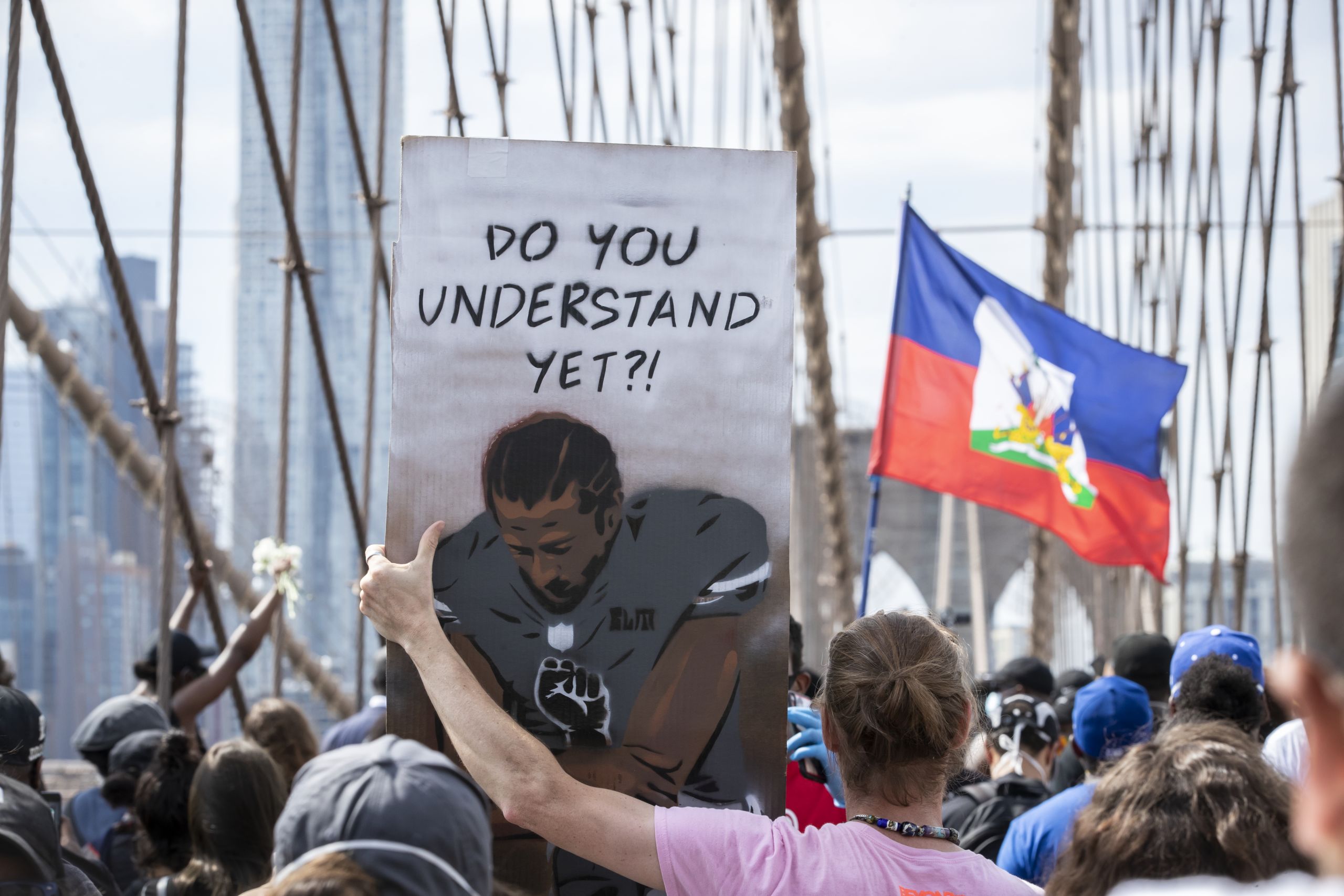
Written and produced by Miriam Walker-Khan
Photos: Getty Images, Reuters, Knox College
Illustrations: WorkbyMischief
Editor: Sam Chadderton
Sub-editor: Reece Killworth
Special thanks to Phil Dawkes, Amy Miveld, Califia Davis, Nelson Kumah and Rasheed Speede
